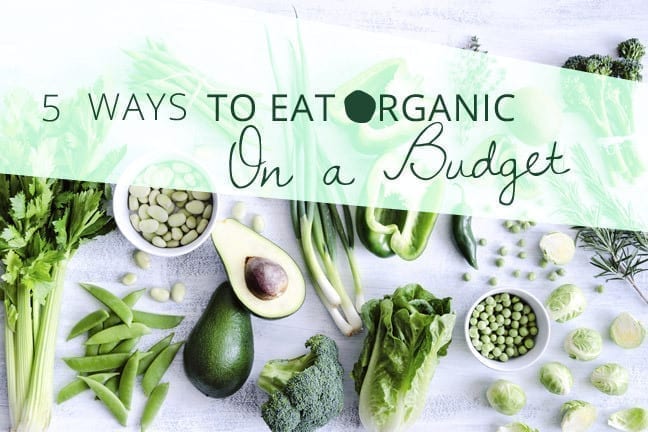Many consumers are willing to pay more money for organic foods because they value the health and environmental advantages, but the question that arises is: “Is it worth it?” This comes up frequently because organic foods tend to be much more expensive than their conventional counterparts. The truth is that, when equipped with the right tools, you can eat organic without making a major dent in your bank account.
Use the following five tips to become a savvy organic shopper and start eating organically—without your wallet taking a big hit.
1. Avoid foods that will not provide the benefits of the organic seal:
Certain foods absorb higher levels of contaminants and pesticides than others. However, ones that contain few pesticides do not appear to provide nutritional benefits when they are purchased organically. The Environmental Working Group (EWG), a public health research and advocacy organization, produces an annual guide to pesticides in produce based on an analysis of 28,000 samples of produce collected by the United States Department of Agriculture and the Food and Drug Administration. EWG determines which fruits and vegetables are the least likely to test positive for pesticide residues, known as “The Clean 15.” In other words, not only do these 15 fruits and vegetables pack the same nutritional punch in organic and non-organic varieties, but you won’t cut your pesticide risk by opting for the more expensive option.
Here they are:
• Asparagus
• Avocado
• Cabbage
• Cantaloupe
• Sweet Corn
• Eggplant
• Grapefruit
• Kiwi
• Mango
• Mushrooms
• Onion
• Papaya
• Pineapple
• Sweet peas (frozen)
• Sweet potatoes
Additional foods that are not worth buying organic (or even non-organic) are processed foods, such as chips, crackers and cookies. From a nutritional prospective, what really counts is that the product is low in fats, added sugars and calories. Cookies are always going to be cookies, high in calories and fat and sugar. Even if the cookie is made with organic ingredients, it is still a high-calorie indulgence. If you are trying to lose weight or eat better, the best advice is to skip the cookies altogether.
2. Buy in bulk:
Most of us live near a wholesale store, many of which sell organic foods in bulk. If you’re searching for an inexpensive way to purchase organic foods, it may be worth getting a membership to one of these stores. For instance, you can save between 20 to 35 percent on organically raised chicken when bought in bulk vs. not in bulk. Other cost savings can be found in organic milk and even coffee.
3. Buy fresh, freeze and eat later on:
The invention of the freezer allows us to stockpile our food. When going organic, use your freezer to your advantage. You’ll not only save money (such as when stocking up on a sale item), but you’ll also be able to keep plenty of organic foods ready and available at a moment’s notice. Organic strawberries and blueberries are ripe in the summer, but freeze them and you can enjoy the taste and nutrients in the fall and winter, too!
4. Buy organic in the freezer section:
A December 2013 study looked at the difference in the vitamin and mineral content of eight different fruits and vegetables when they were fresh versus frozen. While the produce was not organic, the findings are still applicable. The researchers found that fresh produce degrades over time, resulting in a loss of certain nutrients. Fresh produce stored for five days had lower values of vitamins A and C and folate compared to the frozen version. What’s more, you can use what you need and put the rest back in the freezer, rather than risking the food going bad and then having to throw it out—along with the money you spent.
5. Go to your local farmers market:
Purchasing organic foods from a local farmers market is another way to cut costs. Going to the farmers market gives you an opportunity to interact with the farmer or someone from the farm who may be able to give you a special deal. During certain growing seasons, farmers often have a larger supply of fruits or vegetables that grew well that season. Instead of letting the excess go to waste, farmers often negotiate a deal on their produce. Want to wheel and deal with your local farmer but don’t know where to start? Click here to find a farmers’ market near you.You can eat organic without going broke—sometimes all you need is just a little creativity and know how! Brigid Titgemeier, nutrition assistant, and Liz Bedell, dietetic intern at the Cleveland Clinic Wellness Institute, contributed to this article.




































